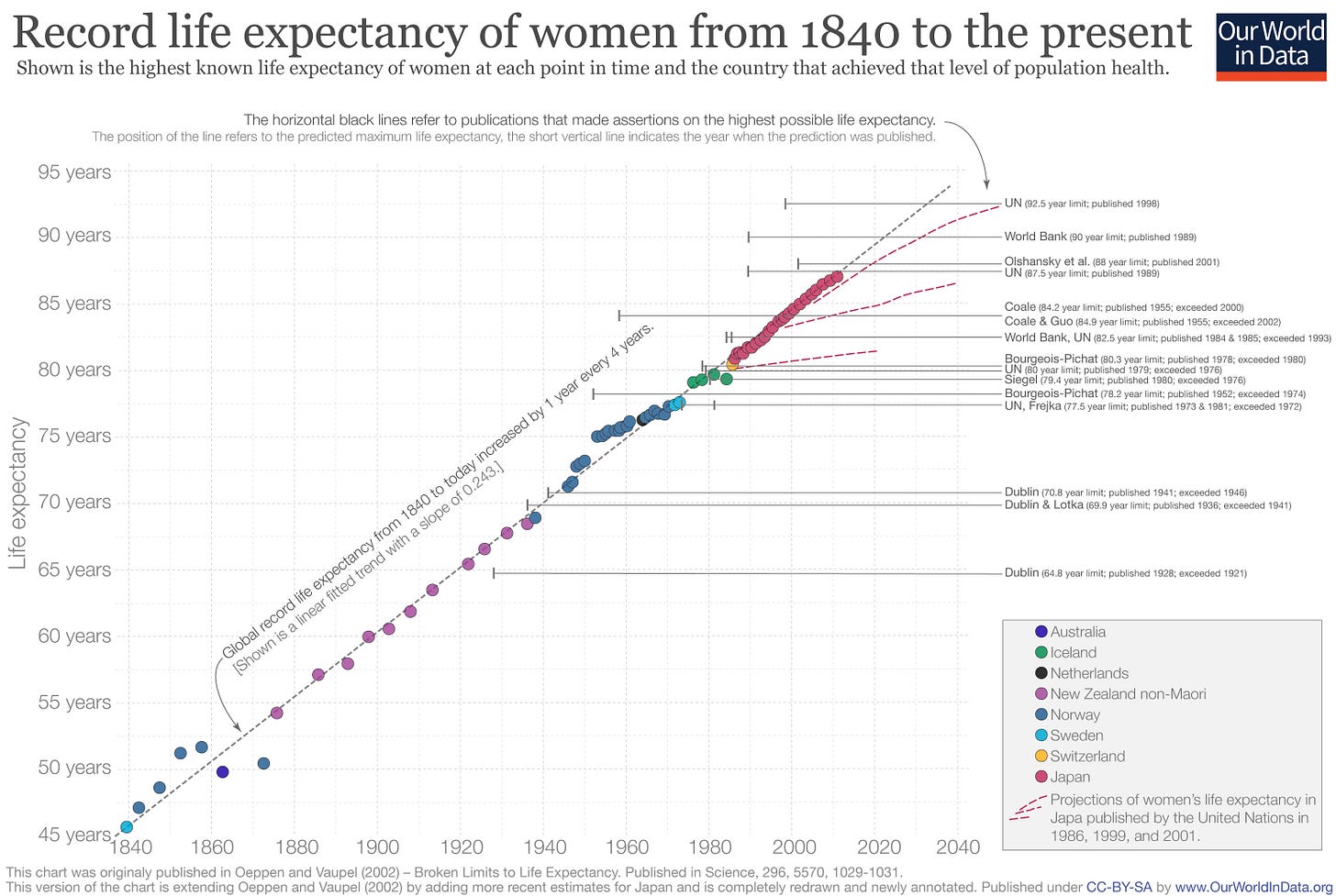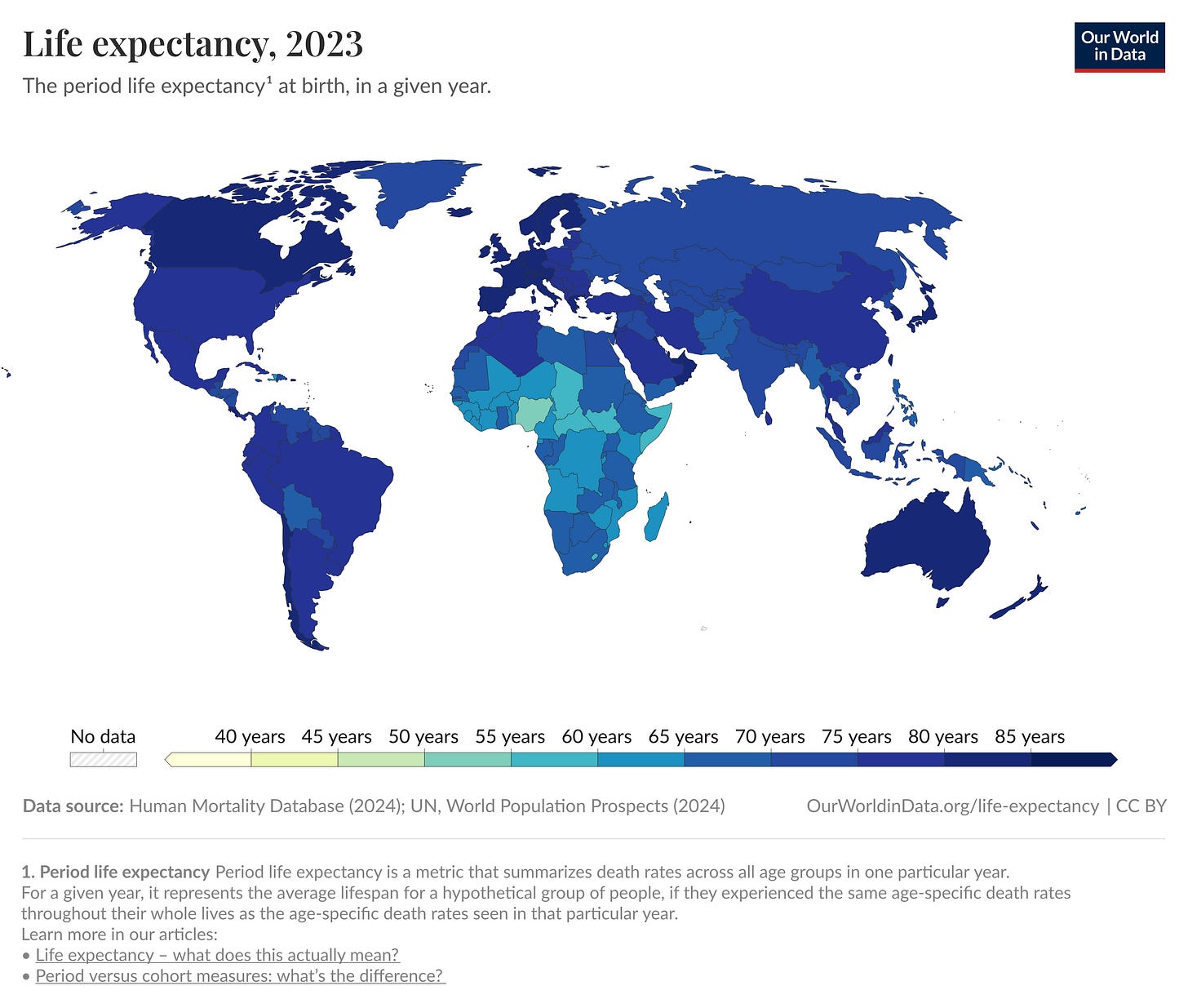Will humans start living to 150 soon?
A conversation between world leaders prompts an exploration into the history of human health
Life extension is in the news this week, as the Russian President Vladimir Putin and Chinese leader Xi Jinping were caught on an open microphone. Putin, through an interpreter, said:
“Human organs can be continuously transplanted. The longer you live, the younger you become, and [you can] even achieve immortality.”
Their exchange ended with Xi replying, “Some predict that in this century humans may live to 150 years old.”
Humans are astonishingly good at growing old. We often forget this when discussing futuristic life-extension technology, but the truth is, we're already a species running in overdrive. Over the last 100,000 years, we’ve evolved longer lives, engineered safer environments, and manipulated our biology to push the limits. When it comes to longevity, our species is already ‘overclocked.’ So, when world leaders speculate about living to 150, are they predicting the next great leap, or are we nearing our biological limit?
Human lifespan in context
When I say that humans are good at growing old, I don’t mean that we’re the longest-lived species. If there were an Olympics of aging, humans wouldn’t even make the podium. The bowhead whale has a lifespan that can extend more than 200 years. The Southern right whale often lives past 130, fin whales and orcas 90 years or more.
And those are just the mammals. The Greenland shark can live more than 300 years, and the giant tortoise more than 200 also.
Still, humans are quite long-lived compared to most primates. Great apes in their natural habitats often live into their late 40s or early 50s, and at least one wild chimpanzee is known to have survived into the 60s. Humans today around the world in many different kinds of societies often live into their 80s.
It’s common to talk about lifespan in terms of a limit, or maximum. That’s a misleading way of approaching biology. The maximum age of a human being is like the maximum height of a redwood tree: The tallest trees are outliers, and the number of outliers depends on the number of trees and their particular environments. Biologists may talk about theoretical limits to tree height and to age, but in evolution it’s valuable to remember Ian Malcolm’s maxim. Life finds a way.
It’s easy to find examples of the power of environment. Chimpanzees, orangutans, and gorillas in zoos and sanctuaries live 10 to 20 years longer than other members of their species in their natural habitats. The record lifespan in a zoo chimpanzee is 82 years; the oldest living gorilla is 68 and still going.
Humans, in other words, are pretty good at helping great apes live longer. Just changing their environments can cause a jump of 25% to 30% in lifespan.
How does this happen? Environments make a big difference to lifespan in two ways. Death at any age can result from pathogens, accidents, fights, or starvation. Captivity can be a negative experience for animals in many ways, but it often provides reliable food, with more reliable micronutrients (while far from perfect), no predators, reduced fights, vaccination against common pathogens, clean water, and veterinary care. All these reduce mortality among infants, juveniles, and young adults, increasing the average lifespan. A side effect is that more adults surviving into older adulthood bring with them greater genetic and developmental variation. More individuals, more variation, more chances that a few outliers will live a lot longer.
The other way that environments matter is the “wear and tear” aspect of senescence. Cutting down on the trudging, running, climbing, scrambling, digging, or pounding every day to find and process food leads to less degeneration of the body. Better diets and fewer pathogens help improve tissue maintenance. This same principle in humans has engendered the idea of “body age” as a substitute for calendar age.
Although captive apes may have longer adult lifespans than their wild relatives, there are many health problems in captive animals, from obesity and metabolic syndrome to mental health and behavioral challenges. These consequences of captivity show that environmental changes that may increase lifespan are not always good for health and wellbeing. That insight has parallels in human health also.
How humans have increased lifespan
When I say that humans are “overclocked” for longevity, what I mean is that several progressive changes in biology and culture have unfolded to increase lifespans during the last 100,000 years. Those increases have involved both changes in development and cultural shifts in environments.
As a starting point we can look at the Neanderthals. A few of their skeletons come from old individuals, such as the La Chapelle-aux-Saints individual who may have lived into his 60s. But the fraction of Neanderthals who lived into their late 30s appears to have been quite low. Mortality among young adults was especially high. Meanwhile, most older adults show quite profound senescent changes, especially osteoarthritis and joint degeneration, as well as extreme tooth wear and tooth loss.
We know less about the health of other human groups of this age or older, such as Homo erectus, but none have skeletons suggesting they lived any longer. Taking our ancestors as a whole, they may have averaged shorter lifespans than wild chimpanzees.
That changed in the archaeological record with the Upper Paleolithic in Europe, and the last 50,000 years in most other parts of the world. New means of collecting prey animals and plant foods led to more reliable and less risky foraging. Populations grew, they diversified their resource base, and fewer adults died young. For the first time, a fairly large fraction of people were living into their 50s, 60s, or beyond.
Evolution likely helped drive this Pleistocene pulse of longer lifespan. Modern humans manifest slower childhood development than Neanderthals, and later maturation. This slowdown of development may have affected neural plasticity and tissue senescence. Healthier aging was one side effect of our cultural evolution.
Subsequent shifts in lifespan were more like the environmental interventions that affect captive great apes.
Farming and herding, and the associated changes in patterns of movement, helped many adults live longer. At the same time, these new practices increased the number and virulence of pathogens. Sedentary people who lived in villages often lived longer than foragers—as long they were spared by war and disease. These shifts, which the epidemiologist Abdel Omran recognized as the First Epidemiological Transition, led to a paradox: Longer adult lifespans and population growth were coupled with much higher infant and childhood mortality.
Industrial economies built the Second Epidemiological Transition. Rising standards of living, vaccines, sanitation, and changes in work all led to lower childhood and younger adult mortality, and greater longevity. In this phase of human history, longer lifespan has been coupled with lower infant and childhood mortality.
As a result the twentieth century in nations with early industrialization gave rise to the largest changes in lifespan ever seen in human history. Increases in lifespan and reductions in infant and childhood mortality continue around the world today as developing economies continue to improve access to vaccination, sanitation, and health care.
But the progressive increases in longevity in many industrialized nations have begun to slow down. This suggests that we may be approaching a point where the changes in environment have diminishing returns. The maximum known lifespan for any human is 122 years, and fewer than 80 people in history are known to have lived longer than 115. Reaching age 90 is more common: Close to 24% of Americans born in 1930 survived to at least this age.
Could the current picture be something like a steady-state as rates of aging and lifespan come to an equilibrium around the world?
Looking for another transition in aging
The challenge to any attempts to increasing lifespan further in the United States, Western Europe, China, or Japan is that these populations have already done an awful lot of engineering on the environments that matter to aging. Most of the easy big gains were realized during the twentieth century with sanitation, vaccination, changes in work, and reduction of accidents.
Of course there are further changes that would improve health and lifespan in each of these populations, which are abundantly evident by comparing outcomes in these different countries. Reliable access to health care for all people, especially older adults, matters a lot to healthspan. Cultures and environments that minimize obesity and metabolic syndrome matter, as does the prevention of addiction, especially nicotine and alcohol. Early detection and effective treatments for various cancers makes a huge difference. Vaccination matters enormously.
“It is not enough for a great nation merely to have added new years to life—our objective must also be to add new life to those years.”—John F. Kennedy
These aspects are central to the understanding that lifespan is not enough without maintenance of health, social life, and agency for older adults. The holistic approach to aging emphasizes healthspan more than lifespan. Helping more people live past 100 years may not be beneficial if the tradeoff is that few will find those extra years meaningful, comfortable, or enjoyable.
This understanding is informing many scientists whose research focuses on life extension. For example, there’s no doubt that advances in organ transplantation would make an enormous difference in healthspan for millions of people. Breakthroughs in transplantation will not matter much to 100-year-olds, not for a very long time, but they may help a lot of 60-year-olds live healthier lives their 90s.
When Putin talks about endless organ replacements leading to immortality, he is echoing the plots of many science fiction stories, from Never Let Me Go to The Rise of Skywalker. Or heck, Frankenstein. When it comes to healthspan extension, such ideas are just jumping the shark.
Geneticists and specialists in regenerative medicine really are making important advances in understanding cellular regeneration, tissue engineering, and gene editing to shift some of the processes of senescence. This area is one of the frontiers of medicine.
Evolutionary biology may yet play an important role. The Greenland shark, bowhead whale, and giant tortoise are extremely distant relatives, yet all have evolved extended lifespans. Finding their commonalities and unique differences from their closer relatives may help biologists learn how to tweak our own cellular processes in valuable ways.
But no current approaches suggest that many humans will be living to 150 anytime soon. Maybe like the tallest redwoods we will start to see outliers start to edge toward the age of 125 or 130, out beyond the current record. But I think the most likely consequence of today’s approaches will be a greater survival of people from the 80s into the 90s, not a large extension of lifespan of 100-year-olds.
Bottom line
In the last century, political leaders, monarchs, and dictators around the world have had a better shot at long lifespan than most people. President Jimmy Carter died last year at 100, Queen Elizabeth II reigned until age 96, and Celâl Bayar, President of Turkey in the 1950s holds the record by surviving to age 103.
It seems not to matter much whether a ruler was just or unjust, good or bad. Nelson Mandela lived to 95; so did Robert Mugabe.
Certainly many world leaders and business magnates have shown an obsession with living longer. Some tried for immortality with chemicals, some with spiritual guides, and some had their bodies frozen for a chance at future revival. It’s no surprise that some are taking a special interest in newer means of life extension. Maybe some will get a few extra years.
But for me, I think it’s more important to remember that we have the ability today to extend lifespans around the planet. War is cutting lives short in many parts of the world. Vaccinations for many common viruses and other pathogens are not being provided to large segments of the world’s population. Safe water for drinking and washing is not readily available in many places, and many children are dying unnecessarily as a result.
Solving these problems isn't easy, but it doesn't require futuristic biotechnology. The single most powerful life-extending tool we have is engineering better environments. By providing access to vaccines, clean water, and safety from conflict, we can engineer longer healthspans for millions around the world. I hope our leaders focus less on their own immortality and more on the lives they could be saving right now.
Notes: Any time I write about lifespan and longevity, there is the challenge of conveying the difference between demographic measures such as life expectancy at birth, and other measures of lifespan and senescence. In this post I have tried to avoid those details in favor of a more accessible read, but it’s clear that the different ways of looking at lifespan intersect in complicated ways. That’s evident from my discussion of lifespan in apes, for instance, where surviving childhood actually may matter quite a lot to how individuals age in a population, but is not what most people in “lifespan extension” are thinking about.
There’s much more for me to add on the lifespans of fossil hominins. I’m doing some interesting research in this area now and hope to share some as I go.
I appreciate my conversations with Caleb Finch, Michael Rose, Rachel Caspari, Sang-Hee Lee, and many others who have thought deeply about these issues with longevity in human history and prehistory.
References
Borrás, C. (2021). The Challenge of Unlocking the Biological Secrets of Aging. Frontiers in Aging, 2. https://doi.org/10.3389/fragi.2021.676573
Dattani, S., Rodés-Guirao, L., Ritchie, H., Ortiz-Ospina, E., & Roser, M. (2023). Life Expectancy. Our World in Data. https://ourworldindata.org/life-expectancy
Finch, C. E. (2012). Evolution of the Human Lifespan, Past, Present, and Future: Phases in the Evolution of Human Life Expectancy in Relation to the Inflammatory Load. Proceedings of the American Philosophical Society, 156(1), 9–44.
Holmes, O., & Sauer, P. (2025, September 3). Hot mic catches Putin and Xi discussing organ transplants and immortality. The Guardian. https://www.theguardian.com/world/2025/sep/03/hot-mic-catches-vladimir-putin-xi-jinping-discussing-organ-transplants-immortality
Kyriazis, M. (2020). Ageing Throughout History: The Evolution of Human Lifespan. Journal of Molecular Evolution, 88(1), 57–65. https://doi.org/10.1007/s00239-019-09896-2
Rose, M. R., & Mueller, L. D. (1998). Evolution of human lifespan: Past, future, and present. American Journal of Human Biology, 10(4), 409–420. https://doi.org/10.1002/(SICI)1520-6300(1998)10:4%253C409::AID-AJHB2%253E3.0.CO;2-B
Roser, M. (2020). The rise of maximum life expectancy. Our World in Data. https://ourworldindata.org/the-rise-of-maximum-life-expectancy





Greg Cochran, when he was still regularly blogging, would often talk about aging from an evolutionary angle. One perspective he shared was on the relationship between parental (really paternal) aging and genetic load.
After the age of 30 or 35 the number of de novo germline mutations in males starts to increase logarithmically. Older fathers thus pass on more mutations to their offspring than younger fathers. Historically, one of the biggest drivers of high paternal age was polygamy, because it delays and extends male fertility deeper into adulthood. The implication being that populations with long histories of polygamous marriage patterns and high average paternal age (such as much of sub-Saharan Africa and Australian Aborigines) would have significantly higher rates of genetic load.
There's been some other work on generation time differences between populations that also have some bearing on this topic. The following study found an average parental generation time (combining male/female ages) in East Asians, South Asians, and Europeans of around 20 over the past 10,000 generations compared to Africans at almost 27.
https://www.science.org/doi/10.1126/sciadv.abm7047
The time-depth of these generations intervals implies two things to me: 1.) the ancestors of Eurasians were diverged for a very, very long time from the ancestors of contemporary Africans 2.) likely post-Neolithic differences in marriage patterns between populations aren't the main determinants of paternal age differences between populations (at least not on the macro-level between Africans and Eurasians).
This begs the question of why the ancestors of Eurasians would have had such lower parental ages compared to Africans for so long? And circling back to my initial point about genetic load, a lower long-term generation interval among Eurasians would also have the effect of increasing the accumulation of mutations among the Eurasian population, which would in turn also necessitate higher load accumulation as well, right?
I suspect we don't currently have a good general understanding of the actual phenotypic consequences of the mutation rate differences between populations. I also wonder if our current estimates for population divergences and molecular clock calibration are biased without taking these generation interval variances into account.
Putin forgot/overlooked that the brain ages and obviously cannot be replaced with new brain having the life experience, person-ness of the original--at least, not yet.
His comment reveals his morality and ego that an individual would choose to maintain their life at the expense of humans, using current science. I immediately thought of Trump choosing to live to 150, getting new organs to maintain himself. It really is, to me, disgusting.